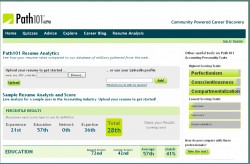Mom used to be so proud when as a little kid I would tell people I wanted to be an engineer when I grew up. Mom, of course, was thinking bridges, airplanes, rockets. I was thinking trains. As in driving them.
When she finally caught on, she’d cut me off to say, “I think he might be a lawyer.”
 Nowadays, freshly out of work adults are asking themselves a version of that same question. But they have tools to help them explore a world of options and see how well their background and personal makeup fit other occupations.
Nowadays, freshly out of work adults are asking themselves a version of that same question. But they have tools to help them explore a world of options and see how well their background and personal makeup fit other occupations.
The latest entrant in the career planning arena is Path 101. Saying it “helps people figure out what they want to do with their career,” co-founder and CEO Charlie O’Donnell and his team have put together a fairly extensive list of industries and occupations showing the kind of longevity people have, the education required for the job, and several other datapoints. They did this by combing the Internet for career profiles, resumes, and the like, and then distilling the information into statistical compilations that are graphically depicted on the site.
For each occupation there are tabs for education, career paths, jobs, which are pulled from Indeed, and something called “insider info,” which has limited content, but is where feeds from industry bloggers will offer news and tips, and where lists of targeted resources will be found. Sprinkled in each area are bits and bytes of information, such as the personality traits common among individuals in the profession. Where this latter insight comes from isn’t clear, though there is a personality test available.
For a site 18 months in the development, there has to be some disappointment over January’s launch by Monster of its own career-planning tools. The Monster offering is equally graphical though deeper and more robust, with the data compiled from Monster’s inventory of several million resumes, supplemented by labor statistics from the federal government and the company’s own surveys. In fact, its career benchmarking channel offers a few things I’d want to know if I was scouting around for a new career: What does it pay and how have people with my background fared in the industry.
Path101 also bears a resemblance to Vault.com in the nature of some of the information, right down to the personality traits component. Vault, however, takes a different road, presenting compilations of industry surveys, current news, and participant surveys.
When O’Donnell described Path101 at the ERE conference a year ago, he placed an emphasis on the community component. And in the alpha version of the site that launched today, there are signs of how it will be used. In the Advice section for instance, users can seek career guidance. Some already have and gotten responses. The Insider Info sections links to bloggers and Twitter will add to that.
This is where a site like Vault has the upper hand. Its community has been visiting the site for years. And though its messaging is clunky and doesn’t make great — hardly any? — use of Web 2.0 social tools, there is a loyal cadre of regular posters.
As far a business model, O’Donnell says, ” The business model is simple — know the candidate better so we can be a better place to search for people.” It does that by collecting resumes when users upload them to see how they compare to those already in the database. As the users take the various tests, and otherwise add to their profile, a more complete candidate picture emerges.
“We think resumes are a commodity,” O’Donnell adds, “and only by adding more data to the process can you add value. Users give us data (because) they’re trying to figure out their careers and we help them put their own data in a frame of reference.”